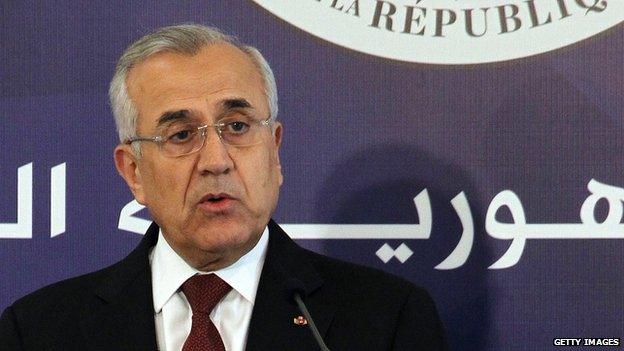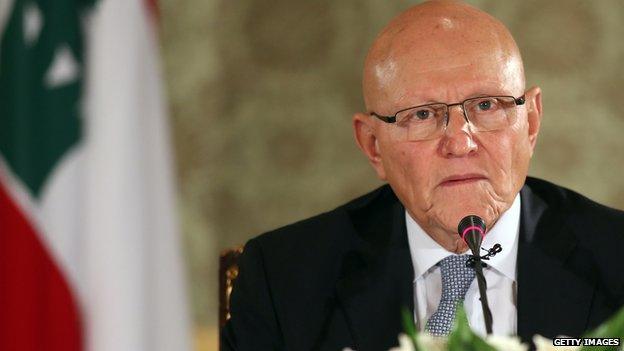Lebanon profile - Leaders
- Published
President: post vacant

Michel Suleiman stepped down as president in May 2014 and has not been replaced
Michel Suleiman vacated the presidency at the end of his six-year term in May 2014, leaving behind a political vacuum chiefly caused by the fallout from the civil war in neighboring Syria.
The president is chosen by a two-thirds majority of parliament, or 85 of the legislature's 128 members.
Several attempts in parliament have failed to agree on a consensus president, some of them because of a boycott by MPs.
Many Lebanese have become accustomed to a protracted political stalemate whenever the time comes to choose a new parliament, government or president. And in the past, politicians have waited for an agreement between outside patrons, such as Saudi Arabia and Iran, to resolve their differences.
Mr Suleiman's term office came to an end at a time Lebanon was deeply divided, with politicians lined up on opposite sides of the civil war in neighouring Syria, some supporting the government in Damascus others backing the anti-government rebels.
Political office is divided by a power-sharing agreement to ensure that the three major religious blocks - Shia, Sunni and Christian - are represented. The National Pact of 1943 established this division, declaring that the president must be Christian, the prime minister Sunni Muslim and the speaker of parliament a Shia Muslim.
Prime minister: Tammam Salam

The Sunni Muslim politician Tammam Salam was tasked with forming a new government in April 2013, after the divided cabinet of his predecessor, Najib Mikati, failed to reach agreement on how parliamentary elections due later in the year should be staged.
In the event, it took Mr Salam ten months to assemble a new power-sharing cabinet. Meanwhile, the elections were put on hold; instability caused by the war in neighbouring Syria may mean they will be delayed for some time.
Mr Salam's unity government is split equally between the two main opposing factions in Lebanese politics - the Hezbollah-led pro-Syria March 8 coalition and the Western-leaning March 14 movement led by Saad Hariri.
The March 8 bloc is Shia-dominated, while the March 14 faction is Sunni-based. The traditional enmity between the two sides has been exacerbated by the conflict in neighbouring Syria, as Hezbollah's Shia fighters have taken the side of the Syrian government while March 14 has supported the rebels.
The length of time it took Mr Salam to form his government is a telling indication of the bitterness of the political divide in Lebanon and the difficulty of getting all sides to agree on the allocation of key ministries.
Announcing the new government, Mr Salam said that it was "the best formula to allow Lebanon to confront challenges", but some of these challenges are likely to be extremely tough ones and the cabinet may struggle to avoid becoming deadlocked over key issues.
Tammam Salam was born in 1945 into a prominent Lebanese political family. His father, Saeb Salam, served as prime minister six times between 1952 and 1973.
Mr Salam does not belong to any political party. His independent status facilitated his acceptance by the Lebanese parliament, which voted overwhelmingly in favour of his nomination after the fall of the Mikati-led government.
He was first elected to parliament in 1996 and served as minister of culture from 2008 to 2009 in the national unity government led by Fouad Siniora.